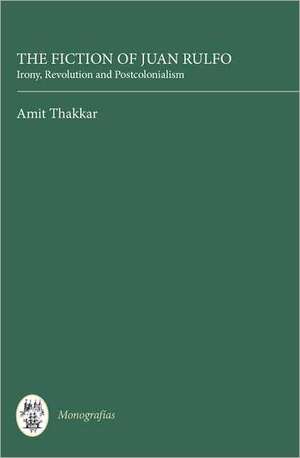The Fiction of Juan Rulfo – Irony, Revolution and Postcolonialism
Autor Amit Thakkaren Limba Engleză Hardback – 14 apr 2012
Preț: 466.62 lei
Preț vechi: 576.07 lei
-19% Nou
Puncte Express: 700
Preț estimativ în valută:
89.30€ • 92.89$ • 73.72£
89.30€ • 92.89$ • 73.72£
Carte indisponibilă temporar
Doresc să fiu notificat când acest titlu va fi disponibil:
Se trimite...
Preluare comenzi: 021 569.72.76
Specificații
ISBN-13: 9781855662384
ISBN-10: 1855662388
Pagini: 190
Dimensiuni: 165 x 240 x 18 mm
Greutate: 0.52 kg
Ediția:New.
Editura: Tamesis Books
ISBN-10: 1855662388
Pagini: 190
Dimensiuni: 165 x 240 x 18 mm
Greutate: 0.52 kg
Ediția:New.
Editura: Tamesis Books
Notă biografică
Amit Thakkar
Cuprins
Acknowledgements
Introduction
Juan Rulfo and Fictional Irony
Centripetal Irony in 'Nos han dado la tierra' and 'El día del derrumbe'
Centrifugal Irony and 'La Unidad Nacional'
Ambivalence and the Crisis of the Mimic Man: Irony and Context in 'Luvina'
The Priest of Pedro Páramo:Fetishistic Stereotyping and Positive IconographyPedro Páramo: Irony and Caciquismo
Conclusion
Bibliography
